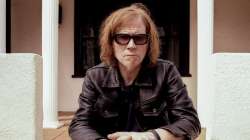Mark Lanegan, Screaming Trees singer, dies at 57
Mark Lanegan, the singer whose raspy baritone and darkly poetic songwriting made Screaming Trees an essential part of the early Seattle grunge scene and brought him an acclaimed solo career, died Tuesday at age 57.

Iconic singer and frontman of Screaming Trees, Mark Lanegan passed away on Tuesday at his home in Killarney, Ireland. He was 57. The management company SKH Music confirmed his death. A statement was also released on the singer's Twitter account which read, "Our beloved friend Mark Lanegan passed away this morning at his home in Killarney, Ireland. A beloved singer, songwriter, author and musician he was 57 and is survived by his wife Shelley. No other information is available at this time. We ask Please respect the family privacy."
Mark Lanegan had joined Screaming Trees in the 1980s and produced eight studio albums before the group's split in 2000. He also had his solo career which was equally successful. He garnered a huge fanbase with his music and collaborations with Queens of the Stone Age and many others
Several musicians mourned his demise and took to social media to express their grief. John Cale of the Velvet Underground tweeted, "Mark Lanegan will always be etched in my heart - as he surely touched so many with his genuine self, no matter the cost, true to the end." Iggy Pop said, "Mark Lanegan, RIP, deepest respect for you. Your fan, Iggy Pop."
Peter Hook tweeted, "Mark Lanegan was a lovely man. He led a wild life that some of us could only dream of. He leaves us with fantastic words and music! Thank god that through all of that he will live forever. RIP Mark. Sleep well. Love Hooky. X"
Lanegan formed the Screaming Trees in 1984 in his hometown of Ellensburg, Washington. A drummer at first, he said he was so inept he had to become a lead singer.
With their mix of moody pop and a hard rock that leaned into psychedelia, Screaming Trees were among the candidates that many thought would break big from the Seattle grunge scene of the late 1980s and early '90s though they would never see the widespread popularity of Nirvana and Soundgarden.
(With inputs from AP)